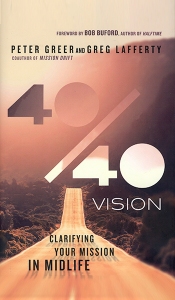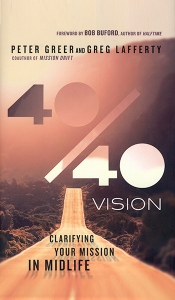 Peter Greer and Greg Lafferty, 40/40 Vision: Clarifying Your Mission in Midlife (Downers Grove, IL: IVP Books, 2015).
Peter Greer and Greg Lafferty, 40/40 Vision: Clarifying Your Mission in Midlife (Downers Grove, IL: IVP Books, 2015).
[Note: This review originally appeared at InfluenceMagazine.com.]
An 80-country survey asked respondents, “All things considered, how satisfied are you with your life as a whole these days?” People in their 40s were least satisfied, with 46-year-olds being unhappiest. I am 46 years old. Needless to say, I read Peter Greer and Greg Lafferty’s new book with keen interest.
The forties are the decade when men and women experience midlife crisis. They are halfway through their lives equidistant from the start of their professions and their retirement. The twenties and thirties are predominated by questions of success. In the forties, however, questions of significance take the lead.
According to Greer and Lafferty, the kinds of questions 40-year-olds ask are these: “All this work, does it even matter? I’ve striven for so long, but I’m still not there—and now I’m losing interest. Why am I not happier? Is this my lot in life? Did I miss my calling? Is it too late for a do-over? Was all that I pursued in my thirties a mistake?” (emphasis in the original).
These are questions of meaning. To navigate the turbulence of the forties is thus to navigate the waters of life’s meaning. And few books of the Bible address the question of meaning more acutely than Ecclesiastes.
But wait, you’re thinking to yourself; doesn’t Ecclesiastes say that life is meaningless? “‘Meaningless! Meaningless!’ says the Teacher. ‘Utterly meaningless! Everything is meaningless’” (1:2). If you’re having a midlife crisis, that’s hardly the kind of statement to cheer you up.
True, but as Greer and Lafferty point out, Ecclesiastes’ perspective is that of a “functional deist,” that is, “a person who acknowledges God’s existence but suffers due to his apparent absence.” Such a person can experience great success and pleasure in life, and yet still discover that they don’t guarantee a meaningful life. What is needed is a larger worldview, an above-the-sun perspective.
An above-the-sun perspective gives meaning to an under-the-sun life not by pooh-poohing success or pleasure, but by qualifying them, by helping us see the goodness in life’s limitations. For example, chapter 6, “(Un)charitable,” deals with the concept of “true wealth.” Ecclesiastes 5:10 truly said, “Whoever loves money never has enough; whoever loves money is never satisfied with their income. This too is meaningless.”
But notice the parentheses in the chapter title; they are important. A person focused on getting is uncharitable. But place that negative prefix un- in parenthesis—qualify or limit it—and you discover that wealth isn’t the problem. It’s the lack of generosity. The authors write, “In the United States, we’ve developed super-sized appetites for pleasure, but we haven’t experienced a corresponding rise in our taste for giving.” Accumulating money doesn’t make you happy or filled with a sense of meaning. Being generous with what you have does, however.
The same can be said for all the goods we pursue in life. They’re not necessarily bad in and of themselves, but they’re unalloyed goods either. A meaningful life recognizes their limited, qualified, under-the-sun goodness.
Only God, who lives “above the sun” is unqualifiedly good, so our search for meaning in midlife must inevitably turn to Him. Of one of the criminals crucified alongside Christ, Greer and Lafferty write: “In many ways, he typifies a wasted life, a nameless man engaged in senseless violence. But during his brief moment on stage, he said a line that goes down as one of the greatest in history: ‘Jesus, remember me when you come into your kingdom’ (Luke 23:42).” And that request saves him. “Boom. Immortal. One moment of clarity in a life of futility, and everything changes.”
Precisely because I’m in my forties, I paid close attention to the advice given in 40/40 Vision, and I recommend it highly, especially if you’re in midlife too. I want my next forty years to be even better than my first forty. I especially recommend reading the book to forty-something pastors. It’s hard enough to lead a congregation under normal circumstances, let alone on top of a midlife crisis. Get help early and often!
At the start of this review, I noted that 46 years of age was the low point of unhappiness in that global survey. If that’s where you are today, you don’t have to get stuck there! For, to borrow a phrase from Ecclesiastes, God will make everything beautiful in its time (3:11).
—–
P.S. If you found my review helpful, please vote “yes” on my Amazon.com review page.

